Democracy and citizenship
Elise Bernard,
Peggy Corlin
-

Available versions :
EN
Elise Bernard
Doctor of Law, Head of Studies at the Robert Schuman Foundation
Peggy Corlin
Journalist
As the tenth legislative term of the European Parliament begins following the European elections from 6 to 9 June 2024, the Foundation offers a review of the previous term of office. This review provides some analysis of the events that have punctuated European news, in terms of the composition, legislative activity and influence of the European Parliament within and outside the European Union.
A. Despite a more diluted Parliament, the core is still positioned in the centre
1/ A fragmented political landscape
After the 27 national elections of 23-26 May 2019 the distribution of seats was slightly more diluted than in previous legislatures. The European People's Party (EPP) and the Socialists and Democrats (S&D), which together accounted for 54% of the total votes in 2014, no longer made up the majority of votes (44.2%). The results therefore reflected a push from the centre (Alliance of Liberals and Democrats, now Renew Europe RE), the Greens (Greens/European Free Alliance) and the Identity and Democracy Group (ID)[1]. In May 2024, the outgoing Parliament comprised 7 political groups: EPP (177 seats), S&D (140 seats), RE (102 seats), Greens/EFA (72 seats), European Conservatives and Reformists (ECR, 68 seats), ID (59 seats), European United Left (GUE/NGL 37 seats) and 50 non-attached Members (NA).
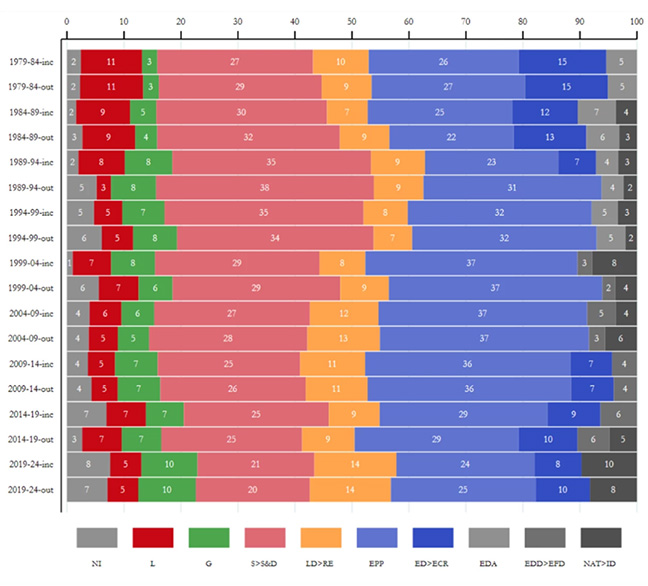
As can be seen from this diagram, put together by the Institut Cattaneo, outlining the composition of the European Parliament at the beginning and end of the legislature since 1979, the two-party majority is less clear-cut, and this has been particularly visible during the 9th legislature. However, as a French diplomat reminds us, in the European Assembly elected by universal suffrage, there is never a "political majority but rather permanent, fluctuating compromises between the political groupings, negotiated in the parliamentary committees via the rapporteurs"[2].
2/ Formally establishing the grand coalition at the centre
From the outset, in July 2019, EPP/S&D/RE coalition was established. Firstly, to ensure parliamentary action, but above all to guarantee what would increasingly become known as the "cordon sanitaire".
The Renew Europe (RE) group, created following the 2019 European elections, succeeded the Alliance of Liberals and Democrats for Europe (ALDE) group and is characterised by its pro-European leaning. As the vote progressed, this group found itself at the centre of the Parliament's political balance, where it has played a mediating role between the centre-left and the centre-right. This position was enabled by the variety of parties that make up the group - around forty, even though the French were largely represented. Although the ALDE had tried to strike out on an alternative, independent path, in the previous legislature, this was no longer the case in 2019-2024.
Initially not formally established, the alliance of the three largest groups in Parliament was the focus of a coalition agreement on 17 January 2022. They stated: "The multiple challenges and opportunities created by the pandemic, climate change, the digital revolution, socio-economic inequalities, the volatile global context, as well as the rise of nationalism, populism and authoritarianism, are forcing us to reinvent the European project so that it will live up to its promises. Europe's citizens expect us to do better and faster.”
The tone was set: the parliamentary majority was not too far to the right of the hemicycle, despite a growing readiness on the part of centrist parties to cooperate, or even govern, with radical right-wing allies in some Member States. Despite their renunciation of euroscepticism and their critical stance towards the Kremlin, the parties in the ECR group have promoted a nationalist ideology that is contrary to the very idea of European integration[3]. Another often overlooked point, is that the American Republican Party is the group’s official partner. This very limited vision of European integration within this group may explain what was foreseen in 2019: an increased alignment of positions hostile to the Union prompted the leading three groups to pursue the cooperation required to prevent Parliament's work from being blocked.
According to the data available on Votewatch and Howtheyvote, for most groups, the index of agreement is very high. Between 2019 and 2024, members of the S&D (87%), RE (84%) and EPP (83%) groups voted in a similar way. The same applies to the Greens/EFA (91%) and GUE/NGL (81%). In the other groups, the indexes of agreement were lower: ECR still achieved 75% and ID only 60%. The "non-attached" have the lowest rate of cohesion, with only 38%. However, this does not mean that voting discipline is not discussed when considering a parliamentary majority with the right wing of Parliament. When Manfred Weber, President of the EPP, suggested blocking the proposal for a regulation on the restoration of nature in agreement with the ID and ECR groups, the motion was rejected (312 votes in favour, 324 against and 12 abstentions) because many EPP MEPs rejected this configuration. This voting instruction was perceived as a coalition implementation that broke with the usual strategy and was not convincing.
This is reflected in the distribution of parliamentary committees.
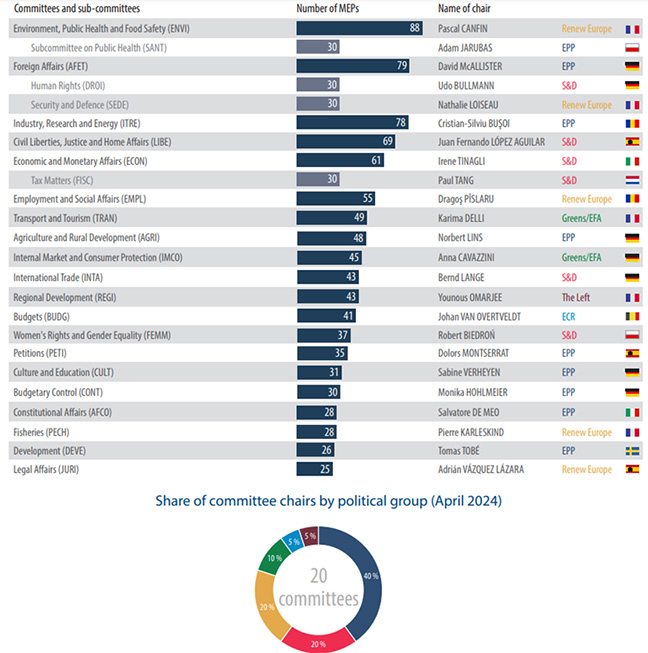
The work conducted within the committees illustrates the parliamentary nature of decision-making. Compromises and majorities are forged within the committees, where groups, nationalities and certain particularly committed individuals can exert their influence. The distribution of committee chairmanships reflects the major political balances and the changing weight of the Member States within the groups and in the Chamber. Through them, the "core" groups have limited the effects of political recomposition and kept the smooth running of parliamentary work under control[4].
After this term in office, the EPP, S&D and RE chair 80% of the parliamentary committees. Respectively: 8 chairs out of 20 for the EPP, 4 for the S&D, 4 for the RE, 2 for the Greens, 1 for the ECR and one for the left GUE. This is a sign of a determination to establish what is known as a "cordon sanitaire" around positions of responsibility. Groups considered radical do not chair committees, sub-committees or special committees[5].
France and Germany are particularly well represented at the head of these committees and sub-committees (5 and 7 respectively), ahead of Spain (3), Italy (2), Poland (2), the Netherlands, Sweden, Romania and Belgium (1 each), marking the definitive end of the United Kingdom's role in this Assembly.
3/ A reshuffled hand post-Brexit
The tone was set on 2 July 2019. Right from its inauguration, this legislature promised to be a special one, with this striking image of the elected members of the Brexit Party turning their backs when the European anthem, Ode à la Joie, was played. The departure of the 73 elected representatives from the United Kingdom on 1 February 2020 led to major readjustments within the European Parliament: the RE Group lost 17 MEPs from the Liberal Democrat Party (LibDem); the S&D Group was deprived of 10 MEPs from the Labour Party and the Greens of 11 MEPs from the Green Party; the ECR Group lost 8 Conservatives from the Tory Party and the non-attached group was reduced by 26 seats after the departure of those from the Brexit Party.
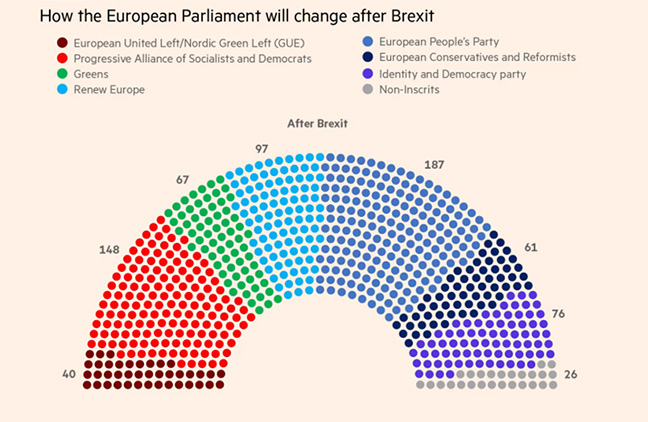
The EPP, which had no British seats in 2019, lost none in 2020 and therefore gained a certain amount of influence as a result of the loss of members from the other groups mentioned above. The other - arithmetical - effect of this reduction in the number of seats was the new position of the ID group (which did not lose any elected members) which took 4th place, due to the reduction in the number of seats occupied by the Green. The European Council’s decision to redistribute 27 of the 73 seats left vacant by the British to the benefit of fourteen States whose population was deemed underrepresented, did not affect the new balance of power.
The EPP was still the largest group in the European Parliament: the departure of the 12 members of the Hungarian FIDESZ party - even before the group had been able to implement sanctions and suspensions against the elected members of the party "which had already quit Christian Democracy some years previously," according Donald Tusk, the then President of the European Council.
This sustained influence may explain the election, in the first ballot with 458 votes, of Roberta Metsola (EPP) from Malta to take over the Presidency of the European Parliament from David Sassoli (S&D) from Italy)[6], on 18 January 2022. She is the third woman to occupy this post, in the wake of French women Simone Veil and Nicole Fontaine[7].
4/ An Assembly with near parity
With the legislative term starting in 2019, the European Parliament had never had as many elected female members in its history: 41% of the seats were then occupied by women, in contrast to 39.5% post Brexit and 39.7% in 2024. This was reflected almost proportionally in the distribution of responsibilities at the Strasbourg Assembly: of the 14 vice-presidencies of the Parliament, there were 6 women. There were 3 women quaestors out of 5. Six of the 20 committees were chaired by a woman, as was one of the 4 sub-committees.
It was within the political parties and groups that an effort was expected to be made. The majority of group chairmen were men. Of the seven groups, only the S&D was chaired by a woman, while the Greens and the Left introduced a shared and equal co-presidency. Cyprus's 6 MEPs were all men, and Slovakia had only 15% of women MEPs, to name but a few. Finland and Sweden, on the other hand, were the Member States with the most female MEPs elected in May 2019.
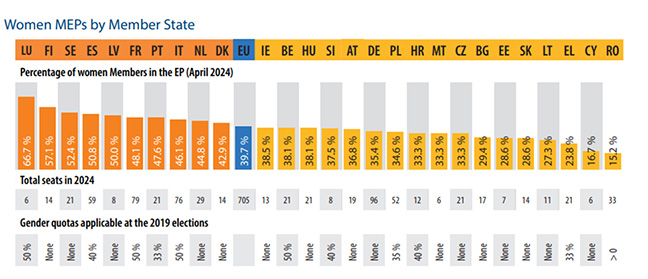
According to this graph in April 2024 Parliament recorded that 4 of Luxembourg's 6 seats were held by women. Luxembourg thus moved into first place ahead of Finland, while one of the six Cypriot seats was filled by a woman elected during the legislature. Romania had the worst parity score (5 out of 33), with two outgoing female MEPs replaced by men.
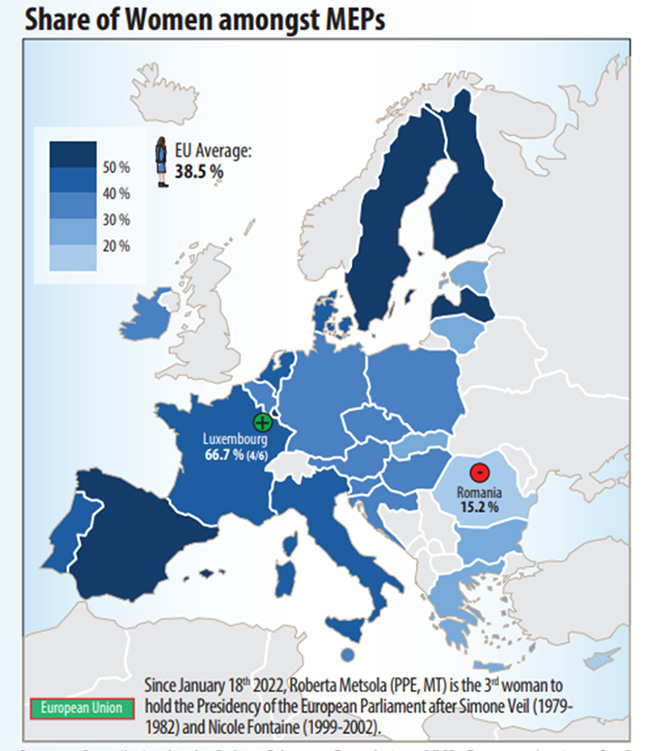
The Schuman Report on Europe, State of the Union 2024
5/ A somewhat turbulent term of office
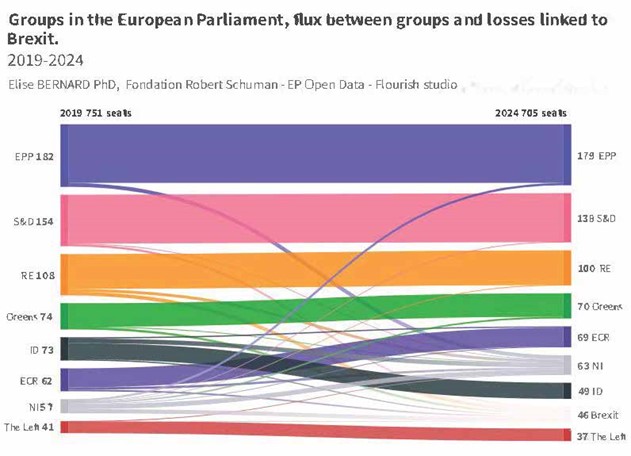
In five years, Members of the European Parliament have passed 370 different laws. The results were similar to those of the previous legislature, when between 2014 and 2019, 401 legislative texts were approved. This reduction in activity can be explained by the upheaval caused by the departure of the British elected representatives, but it was above all the health crisis - and its containment - that prompted the European Parliament to disrupt its functioning. The institution closed, work was digitised, and plenary sessions and parliamentary committees were held at distance by video-conference. Votes were cast by e-mail and then via a secure portal. All votes were cast by roll call, with the exception of secret votes, which were made public, unlike the usual practice in plenary, when votes are taken by roll call only if a group of MEPs so requests. During this period, from March 2020 on, it was no longer possible to hold sessions in Strasbourg, even though the Treaties provide for twelve plenary sessions per year. This raised the question of the European Parliament's dual location in Brussels and Strasbourg. The President of the French Republic, Emmanuel Macron, in a letter to President David Sassoli, called for a return to "institutional normality" by October 2020. Finally work resumed again in the Alsatian capital on 7 June 2021, after a 15-month break.
A major crisis also disrupted the internal workings of the European Parliament. On 9 December 2022, the Belgian police carried out a spectacular arrest of former Italian Socialist MEP Pier Antonio Panzeri, a parliamentary assistant and one of the Vice-Presidents of the European Parliament, Greek MEP Eva Kaili (S&D). A total of €1,350 million was seized and images of the bundles of cash were shown around the world. Other MEPs were accused in an affair which the media presented as a system of corruption at the service of Qatar and Morocco. To date, the case has not been brought to trial and the main protagonists have been released. However, it has seriously tarnished the European Parliament’s reputation, which, under the impetus of its President Roberta Metsola, revised its internal regulations on 13 September 2023 by 505 votes, to 93 and 52 abstentions.
The revision, “with a view to strengthening integrity, independence and accountability", includes: declarations of assets at the beginning and end of each term of office; online publication of meetings between MEPs or their assistants and "interest representatives" (lobbyists) or "representatives of the public authorities of third countries, including their diplomatic missions and embassies"; a ban on MEPs contacting former members engaged in lobbying activities who have left Parliament in the last six months; and tougher sanctions.
At the end of the legislature, foreign interference appears to be a major problem for the functioning of the Assembly, which is supposed to represent the most democratic part of the Union. In March 2024, the Parliament opened an investigation into the activities of Latvian MEP Tatjana Ždanoka - suspended from the Green Group - who has been accused of acting as a "Russian agent" since 2004. That same month, reports revealed that Petr Bystron was linked to the propagandist media channel “Voice of Europe” supported by Russia, a platform that disseminates disinformation and provides financial support to pro-Russian politicians within the European Union. Some of the videos appeared to have been filmed in VoxBox, the Parliament's in-house studio, using the heart of the institution's broadcasting system to disseminate pro-Kremlin messages. In April, the German police arrested a parliamentary assistant from the ID group and the Dresden public prosecutor's office announced two preliminary investigations into alleged payments from Russia and China to an MEP from the ID group. This very same representative was behind the suspension of his party Alternative für Deutschland (AfD) from the ID group for making statements unacceptable to the group on the eve of the vote in May 2024.
B. Event-driven legislative activity
Mirroring the Commission’s priorities and measures imposed by events, Parliament's legislative activity is characterised by risk. With this legislature opening in July 2019, the environmental risk was rapidly being overtaken by the health risk. Finally, it closed with the risk of a high-intensity war. Capital texts were adopted on the basis of Article 122 TFEU in the context of the pandemic crisis, in particular at the time of the joint purchase of vaccines and the SURE instrument for financing short-time working schemes. The same applied to the energy crisis that followed Russia’s attack on Ukraine. Hence from the capping of gas prices, to the reduction of gas consumption and even the joint purchase of gas, the European Parliament was excluded from the decision-making process. If all this is understood as a concern for efficiency, it has perhaps led to a better "communitaurisation" of European defence through the internal market.
1/ The Green Deal
The start of the 9th legislature was marked by the implementation of the “Green Deal”, presented by the Commission in December 2019. With the main ambition of reducing CO2 emissions by 55% by 2030 compared to 1990 levels, with a view to achieving climate neutrality in the European Union by 2050, the Commission proposed the following package “Fit for 55”, which revised and updated EU climate legislation. In line with the resolution of 28 November 2019, in which Parliament declared the climate emergency, 66 texts were adopted, thanks in particular to the EPP/S&D/RE grand coalition, strengthened by the votes of the Greens. This enabled agreements to be reached on unprecedented structural reforms, such as a ban on the sale of internal combustion cars from 2035. According to Howdotheyvote, of the 632 votes cast, only 7 were against and 30 abstained. European industry, air quality and energy sources are undoubtedly sources of intense reflection in the European Parliament. The reforms went further than initially envisaged, particularly in the case of the carbon market. The aim was to extend the principle of emission quotas to sectors that were previously exempt, and to increase the price of carbon for sectors already covered by the principle. In this case, the extension was accepted in addition to the adoption of a "border carbon adjustment mechanism” (CBAM), which offsets the additional costs associated with the existence of this carbon market at the Union's borders. These two mechanisms, designed to provide a source of revenue for the European budget, were largely adopted by the House.
Enthusiasm for the Green Deal waned with the outbreak of war in Ukraine in February 2022. The war had three consequences: energy and food price inflation on a scale not seen for thirty years, increased imports of Ukrainian agricultural products (to support Kyiv's war effort) and a rethink of European defence.
The return of high-intensity warfare to Europe in February 2022 propelled the European Union into a new era for its security and defence and led the European Parliament to take significant action in previously unimagined areas.
2/ Strengthened Defence Industry
After a timid beginning coordination in the award of certain contracts in the fields of defence and security and the development of the European Defence Technological and Industrial Base (EDTIB), the European Defence Fund (EDF) was established by regulation on 29 April 2021. Funded by the Union’s budget to a total of 7.9 billion for the period 2021-2027, strengthened by the STEP instrument and a total of 1.5 milliard € in 2024, it provides financial support for actions carried out by a consortium of at least three "legal entities", established in at least three Member States, to develop new defence products and/or technologies or to improve existing products and technologies.
The invasion of Ukraine by Russia reinforced these new ambitions to put an end to equipment shortages in an increasingly threatening environment, but also to provide support to Ukraine. The adoption of the EDIRPA regulation was slowed down by internal disputes in the European Parliament, between the Industry Committee (ITRE) chaired by Cristian-Silviu Busoi (EPP, RO) and the Security and Defence Subcommittee (SEDE) chaired by Nathalie Loiseau (RE, FR). The Commission's initial proposal was to allocate €500 million, while the European Parliament asked for €1 billion, but the trialogue agreement resulted in a budget of €300 million. In the meantime, the creation of another fund has been planned for the production of munitions in the EU - the Legislative Act to support the production of munitions (ASAP) - €240 million of the amount initially earmarked for EDIRPA. Within the European Parliament, it is the ITRE Committee, which is responsible for industry, that takes care of the substance of this legislation.
C. A greater role inside and outside the Union
1/ A Parliament on the offensive when it comes to the rule of law
The MEPs quickly made their presence felt by rejecting three candidates for the post of European Commissioner. On the basis of allegations of embezzlement against French candidate Sylvie Goulard, as well as allegations of conflict of interest against Romanian candidate Rovana Plumb and Hungarian candidate László Trócsányi, the Parliament of the 9th legislature seemed intent on firmly establishing its role as a counterweight. The legislature was marked by two legal actions launched by MEPs against the European Commission concerning the conditions under which European funds were allocated to Member States that infringed the rule of law, in this case Poland and Hungary.
In October 2021, the European Parliament turned to the European Court of Justice in an action against the European executive for failure to apply the regulation on the cross-compliance mechanism. Since 1 January 2021, this mechanism has made the allocation of European funds conditional on compliance with the rule of law. The appeal was launched as a means of exerting pressure on the Commission, whilst Poland and Hungary challenged the legality of the mechanism before the Court, effectively suspending the possibility of its application. On 5 April 2022, Commission President Ursula von der Leyen finally announced to MEPs that the procedure would be activated against Hungary: on 27 April, the mechanism was indeed formally activated.
Again, in March 2024, the Parliament launched a new legal action against the Commission. The European Parliament this time released €10.2 billion in cohesion funds earmarked for Hungary, at a time when Hungary was threatening to veto European financial support for Ukraine. MEPs consider that the funds were released despite Hungary's failure to carry out the reforms requested to guarantee the independence of the judiciary.
2/ A clear position in favour of Ukraine
In the absence of competences, the European Parliament stepped up its symbolic acts in the field of foreign policy. On 1 March 2022, then on 9 February 2023 during the plenary session of the European Parliament, Ukrainian President Volodymyr Zelensky called for Ukraine to join the European Union "without delay". The MEPs' standing ovations were a strong symbol of the support for the Ukrainians shown by a large majority of Europeans. Roberta Metsola was the first President of a European institution to visit Kyiv on 1 April 2022. She visited again on 9 May 2024, Europe Day.
Resolutions against Russia have become commonplace, benefiting from a very large majority in the Strasbourg Assembly. On 1 March 2022 - by 676 votes to 3 with 5 abstentions – MEPs condemned Russia’s armed aggression against Ukraine. Following the demand for a “total embargo on imports of oil, coal, nuclear fuel and gas from Russia" by 513 votes to 22 with 19 abstentions. On 23 November 2022, a resolution describing Russia as a state sponsor of terrorism was adopted by 494 votes to 58, with 44 abstentions. Finally, on 15 December 2022, the MEPs confirmed their position with regard to the Kremlin's "narrative": Parliament acknowledged the Holodomor - the famine of the Ukrainian people caused by the USSR in the 1930s - as genocide, by 507 votes to 12, with 17 abstentions.
The year 2023 was also rich in positions taken: on 19 January, a resolution was adopted calling for the constitution of a special court to punish Russian officials for war crimes (472 votes in favour, 19 against and 33 abstentions). On 15 June, by 425 votes to 38, with 42 abstentions, MEPs adopted a request made to NATO to launch the process of Ukraine's accession to the Euro-Atlantic organisation.
Admittedly, a European Parliament resolution does not create law. This is the main argument put forward by MEPs who refuse to take part in this type of vote. However, we are talking about strong positions being taken by representatives who have the legitimacy to take them by virtue of their appointment by direct universal suffrage by the citizens of their State of origin. In other words, they are under no obligation to draft and adopt these texts, but if they fail to do so, this will be noticed and they will be criticised for it. Hence the importance of appointing active MEPs in this House, which still seems to want to present itself as being close to its European citizens[8].
The authors would like to thank Loup Panteix and Thomas Richomme, Research Assistants at the Foundation.
[1] New name for the "Europe of the Nations and Freedoms" group.
[2] Maxime Lefebvre, « Le défi de la démocratie européenne », Politique étrangère, no 4, 2018, pp. 73-85.
[3] ECR was created by the British Tories (Conservatives) under the leadership of David Cameron, with the intention of distancing itself from the EPP in 2009.
[4] This is particularly true of the special committee on foreign interference chaired by Raphaël Glucksmann (S&D, FR) or the special committee on spyware with its rapporteur Sophie In't Velt (RE, NL).
[5] Temporary committees are generally only set up in response to exceptional circumstances, and in this parliamentary term we note the committee tasked with investigating the use of Pegasus and equivalent spy surveillance software (PEGA), chaired by Jeroen Lenaers (EPP, NL), the special committee on foreign interference (ING2), which gained in importance during the legislature following Russia's invasion of Ukraine, and the special committee on the Covid-19 pandemic (COVI) chaired by Kathleen Van Brempt (S&D, BE) and its collection of lessons learned from the pandemic.
[6] Following negotiations between the major political forces for the “top jobs” in the European Institutions, after voting on 3 July 2019, in the second ballot by 345 votes, for a two-and-a half-year mandate. Illness took her life prematurely on 11 January 2022, just a few days before the end of her term of office.
[7] Simone Veil (1979-1982), Nicole Fontaine (1999-2002) Roberta Metsola (2022-), i.e. 3 female Chairs in contrast to 14 male Chairs.
[8] To strengthen the transnational dimension of representation, on 3 May 2023 MEPs passed a legislative resolution by 329 votes to 275, with 24 abstentions, calling for the introduction of a 28-seat transnational constituency for the European elections. The Council, which brings together the Member States, has yet to take a decision.
Publishing Director : Pascale Joannin
To go further
Gender equality
Fondation Robert Schuman
—
23 December 2025
Businesses in Europe
Olivier Perquel
—
16 December 2025
Digital and technologies
Josef Aschbacher
—
9 December 2025
Democracy and citizenship
Florent Menegaux
—
2 December 2025

The Letter
Schuman
European news of the week
Unique in its genre, with its 200,000 subscribers and its editions in 6 languages (French, English, German, Spanish, Polish and Ukrainian), it has brought to you, for 15 years, a summary of European news, more needed now than ever
Versions :




